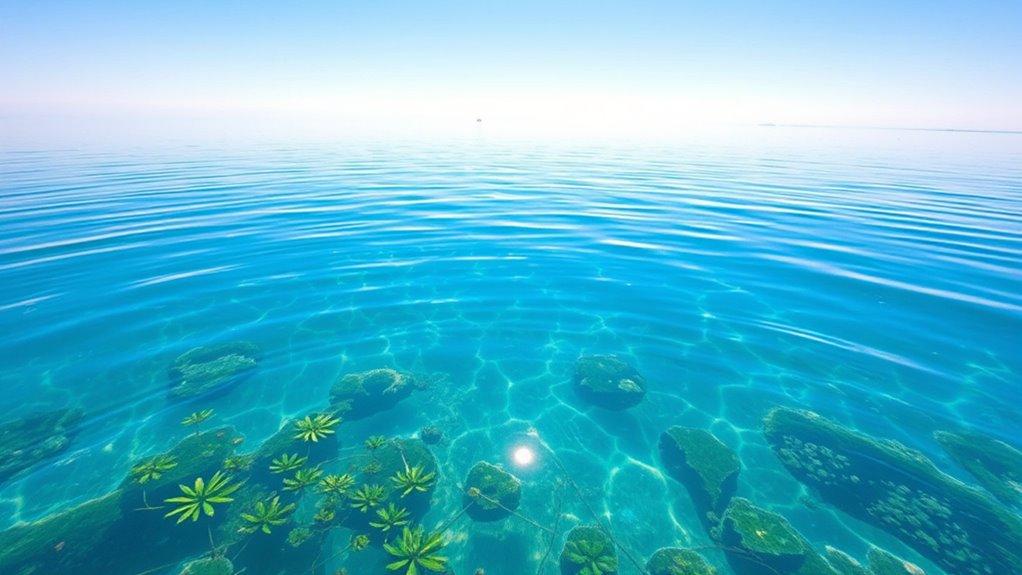Your floating experience heavily depends on water quality. When the water is clean, well-filtered, and balanced with the right minerals, you’ll feel more relaxed and comfortable. Good water quality keeps harmful bacteria and debris out, reducing skin irritation and health risks. It also enhances the water’s therapeutic benefits, making your float more soothing. If you want to discover how proper water care boosts your relaxation, keep exploring the essentials for ideal floating comfort.
Key Takeaways
- Clean water prevents skin irritation and infections, ensuring a safer, more comfortable floating experience.
- Proper filtration maintains water clarity, reducing debris and pollutants that can disrupt relaxation.
- Balanced mineral levels enhance buoyancy and soothing sensations, making floating more effortless and therapeutic.
- Good water quality supports longer sessions by preventing discomfort caused by impurities or imbalances.
- Consistent maintenance of water quality maximizes health benefits and overall enjoyment during floating.

Have you ever wondered how water quality impacts your floating experience? It’s more than just how relaxing or enjoyable it feels; the quality of the water directly influences your comfort, safety, and the overall benefits you get from floating. When water is properly maintained, with good water filtration and balanced minerals, you’re more likely to enjoy a smooth, buoyant experience that leaves you feeling refreshed and rejuvenated. On the other hand, poor water quality can turn your float into a less-than-pleasant encounter, possibly leading to skin irritation, discomfort, or even health issues.
Water filtration plays a vital role in maintaining excellent water quality. High-quality filtration systems remove debris, bacteria, algae, and other contaminants that can accumulate over time. When these impurities are kept at bay, the water remains clear and inviting, allowing you to relax fully without worrying about dirt or pollutants. Clean water also reduces the risk of skin irritations or infections, which can happen when bacteria or algae proliferate in unfiltered water. A well-maintained filtration system ensures that the water stays fresh, which enhances your floating experience and helps you unwind without distraction or concern.
High-quality filtration keeps water clear, safe, and inviting for a more relaxing floating experience.
Mineral balance is equally important in guaranteeing your comfort and safety during floating sessions. The minerals present in the water, such as magnesium and sodium, contribute to the water’s buoyancy and therapeutic properties. When mineral levels are balanced, the water feels smooth and soothing against your skin, providing a gentle, natural buoyancy that makes floating effortless. An imbalance, however, can lead to overly salty or mineral-heavy water that might cause skin dryness, irritation, or discomfort. Proper mineral levels also support the therapeutic benefits of floating, like muscle relaxation and stress relief, by creating an environment that feels natural and calming.
Maintaining water quality isn’t just about aesthetics; it’s about preserving the integrity of your entire floating experience. Good water filtration and mineral balance work together to create a safe, soothing environment. When these elements are properly managed, you’re more likely to float comfortably for longer periods, enjoy the therapeutic effects, and leave feeling truly relaxed. Ensuring that water quality is carefully monitored and maintained is an essential aspect of a successful floating session. Neglecting water quality, on the other hand, can diminish the benefits of floating, making it less enjoyable and possibly even harmful. So, guaranteeing your water is clean and balanced isn’t just a technical detail—it’s the foundation for a truly beneficial and enjoyable floating experience.
Frequently Asked Questions
How Often Should Water Quality Be Tested Before Floating?
You should test the water quality at least once a week before floating to verify it meets water quality standards. Regular water testing frequency helps catch any contaminants early and maintains a safe environment. Keep in mind, if you notice any changes in water clarity or smell, test immediately. Staying consistent with water testing helps prevent health issues and guarantees a relaxing, safe floating experience every time.
What Specific Contaminants Can Impact Floating Safety?
Think of contaminants like uninvited guests crashing your relaxing party. You should watch out for microbial contamination, which can cause infections, and improper chlorine levels, which might irritate your skin or eyes. These issues can turn your floating experience into a health hazard. Ensuring water is properly sanitized and chlorine levels are balanced keeps your floating safe and enjoyable, so you can unwind without worries.
Are There Seasonal Changes That Affect Water Quality?
Yes, seasonal variations and temperature fluctuations considerably impact water quality. During warmer months, higher temperatures can promote algae growth and bacteria, making the water less safe and potentially uncomfortable for floating. Conversely, cooler temperatures often reduce these risks. You should be aware of these changes, as they can affect water clarity, contamination levels, and overall safety, so check local conditions regularly before heading out for a float.
How Do Water Treatment Methods Influence Floating Experiences?
Think of water treatment methods as the magic behind a smooth floating journey. When water filtration is first-rate, debris and impurities vanish like smoke, giving you a crystal-clear surface to relax on. Proper chemical balance keeps the water harmonious, preventing irritation or cloudiness that could disrupt your float. You’ll enjoy a serene, bubble-free experience, feeling weightless and refreshed, thanks to these behind-the-scenes efforts that fine-tune the water’s purity.
Can Poor Water Quality Cause Health Issues During Floating?
Poor water quality can indeed cause health issues during floating. You might be at risk of hydrotherapy risks like skin irritation, infections, or waterborne illnesses if the water isn’t properly maintained. Contaminated water can introduce bacteria or viruses that harm your health. To stay safe, make certain the facility follows strict hygiene standards and regularly tests their water quality, reducing your chances of experiencing discomfort or health problems during your float.
Conclusion
Maintaining good water quality is key to enjoying a safe, relaxing float. Did you know that contaminated water can cause skin irritation or infections in just minutes? By ensuring the water is clean and properly treated, you’ll not only protect your health but also enhance your floating experience. So, always check water quality reports before you plunge in—because a smooth, worry-free float starts with clean water. Your perfect float awaits when the water’s just right!










